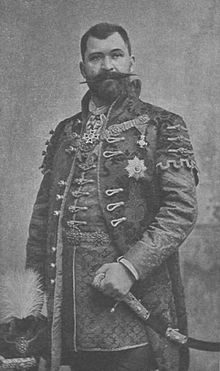József Márkus
| József Márkus | |
|---|---|

József Márkus in 1897
|
|
| Lord Mayor of Budapest | |
|
In office 25 October 1897 – 17 February 1906 |
|
| Preceded by | Károly Ráth |
| Succeeded by | Kálmán Fülepp |
| Mayor of Budapest | |
|
In office 25 November 1896 – 25 October 1897 |
|
| Preceded by | Károly Kamermayer |
| Succeeded by | János Halmos |
| Personal details | |
| Born |
16 August 1852 Szombathely, Hungary |
| Died | 11 March 1915 (aged 62) Budapest, Austria-Hungary |
| Political party |
National Constitution Party (1906–10) National Party of Work (1910–15) |
| Spouse(s) | Janka Feigler |
| Children | Jenő Lily |
| Profession | journalist, politician |
József Márkus (16 August 1852 – 11 March 1915) was a Hungarian journalist and councillor, who served as Mayor (1896–1897), then Lord Mayor of Budapest (1897–1906). He was also a Member of Parliament from 1910 until his death.
He was born into a Transdanubian bourgeois family in Szombathely on 16 August 1852, as the third child of József Márkus, Sr. (1822–1873), who worked as a miller at the local gristmill, owned by Prince Fülöp Batthyány. His mother was Anna Rozália Horvát (1823–1916), a sister of jurist and politician Boldizsár Horvát, who served as Minister of Justice between 1867 and 1871, in the cabinet of Count Gyula Andrássy. His parents married on 25 November 1846 in Szombathely. József Márkus had six siblings, including politician István Márkus (1847–1880), poet Miklós Márkus (1849–1882) and actress Emília Márkus (1860–1949). When the mill burned down after an accident, the extended family moved to Boldizsár Horvát. After the early death of their father in 1873, the smaller Márkus children were raised by Horvát in Budapest, who retired from politics by then.
József Márkus finished his elementary and secondary studies in his birthplace. He attended the Faculty of Law of the University of Pest (today Eötvös Loránd University, ELTE). After graduation, he got a job in the Ministry of Justice, when his uncle still held the position of minister. Decades later Ferenc Harrer pointedly noted in his memoir (Egy magyar polgár élete, "The Life of a Hungarian Bourgeois") that Márkus could thank his professional career merely because of his family relationships. He added that Márkus "was lack of knowledge and diligence". In contrast, other contemporaries argued that Márkus had "classical education, brilliant oratorical skills and extraordinary working capacity".
Márkus married to a Hungarian noblewoman Janka Feigler (1858–1931) in 1877. They had two children, author and civil servant Jenő (born 1879) and pianist Lily (born 1888) who was the wife of painter and graphic Lajos Sz. Gyenes (1890–1971).
...
Wikipedia
